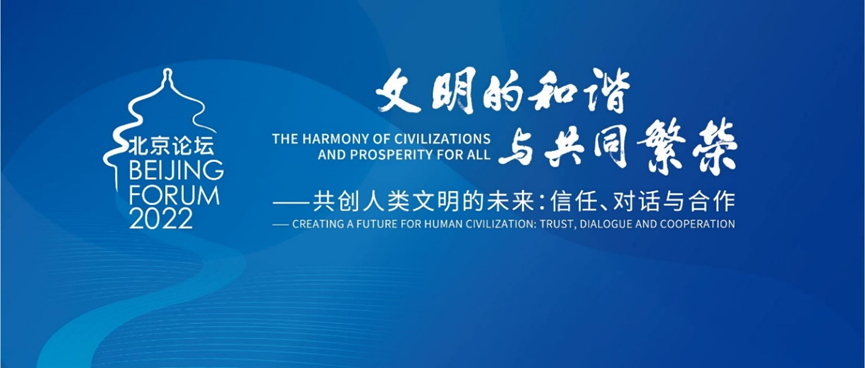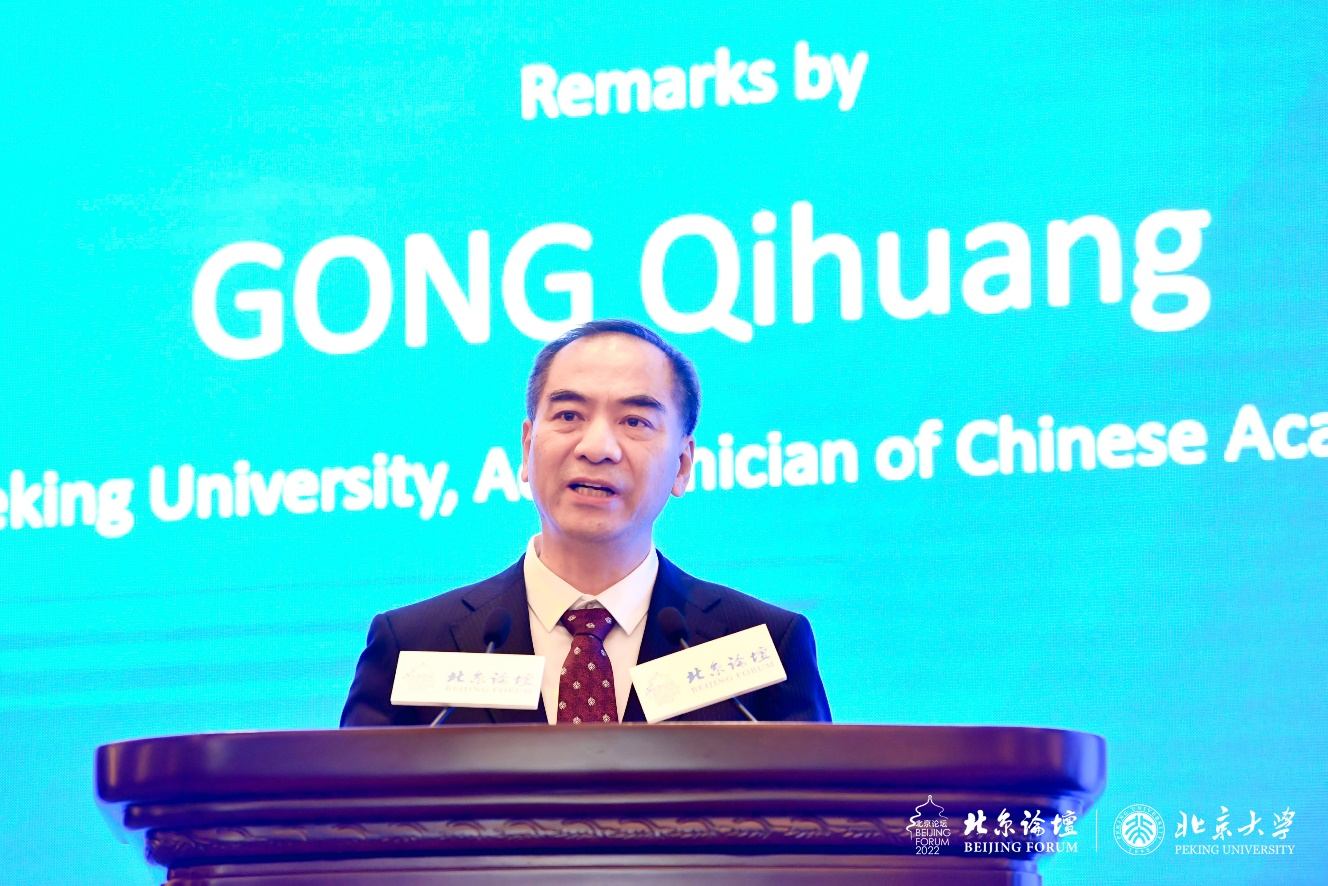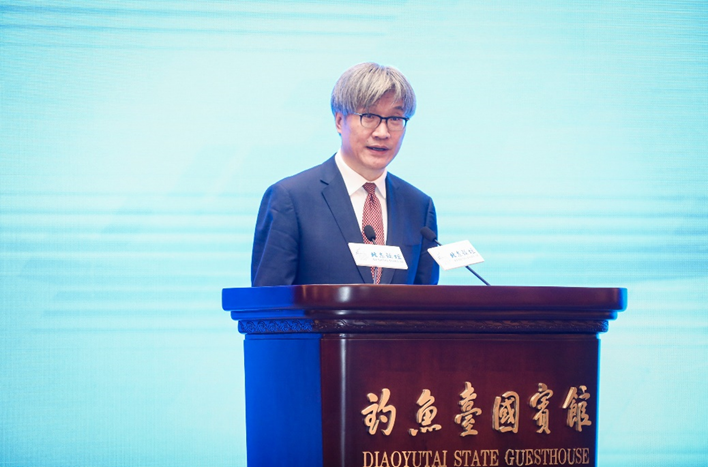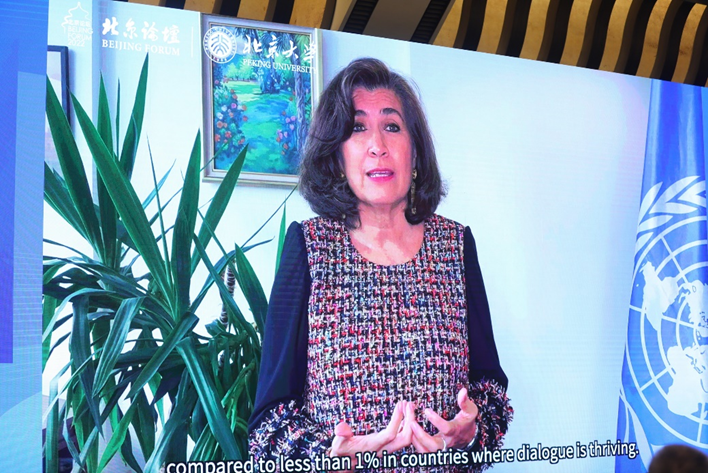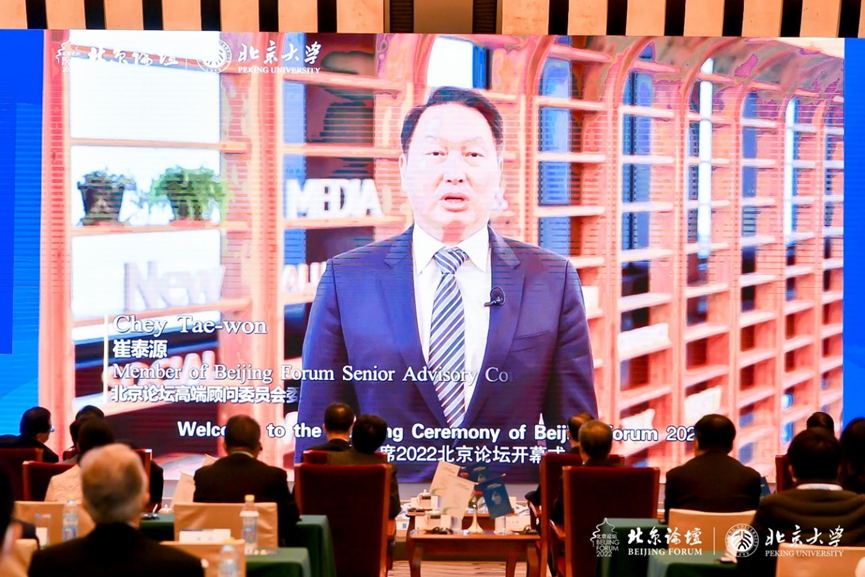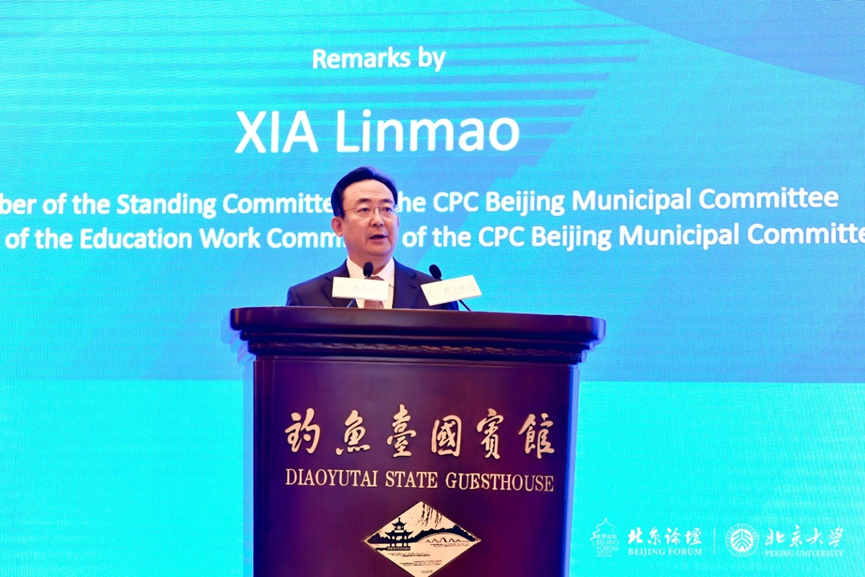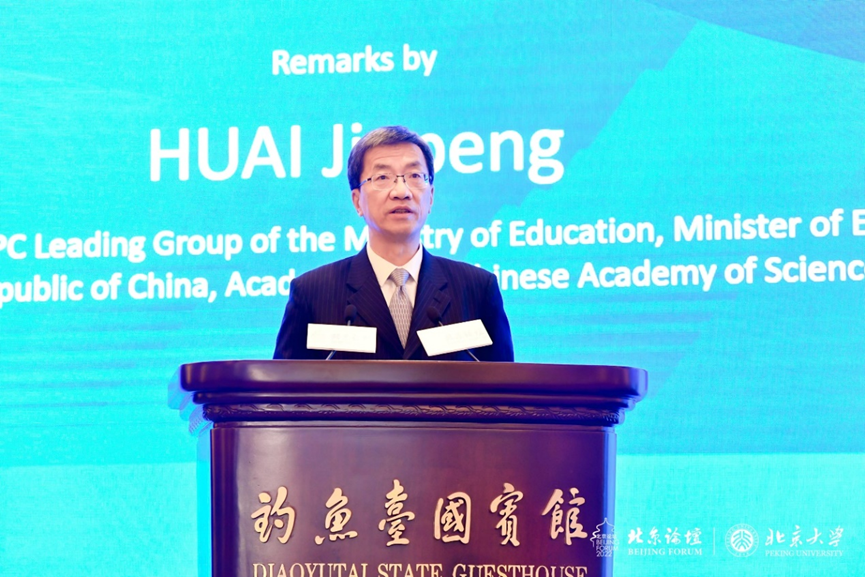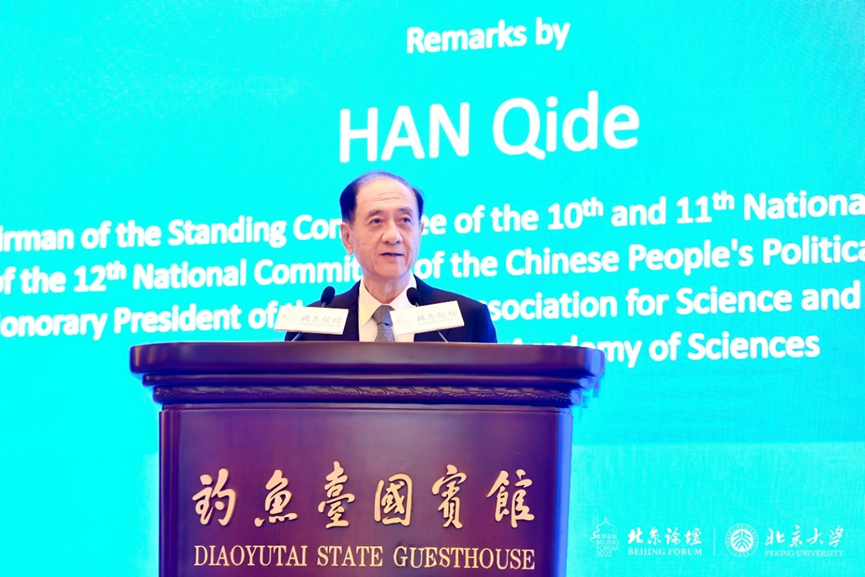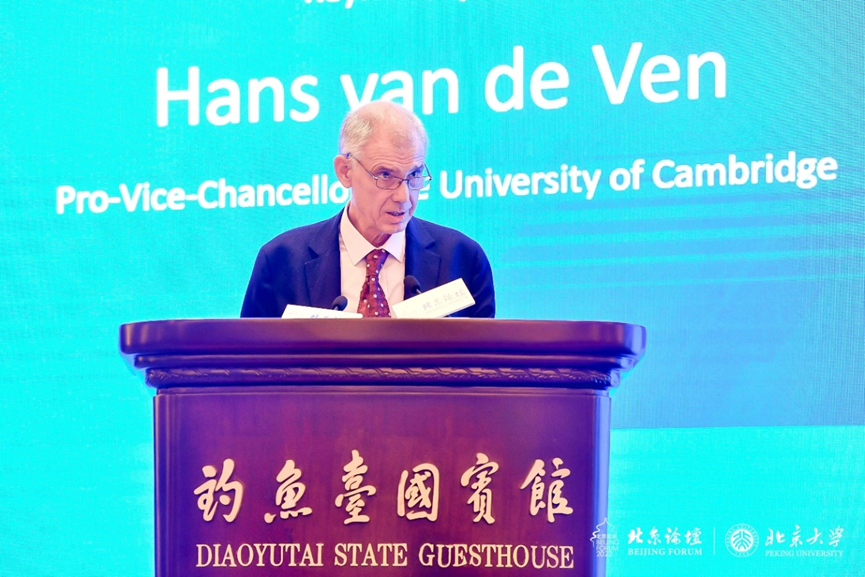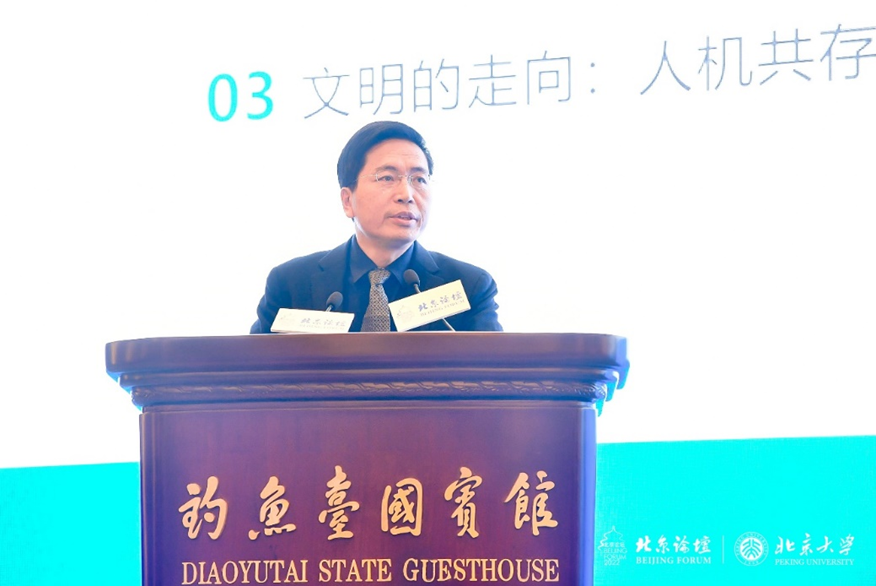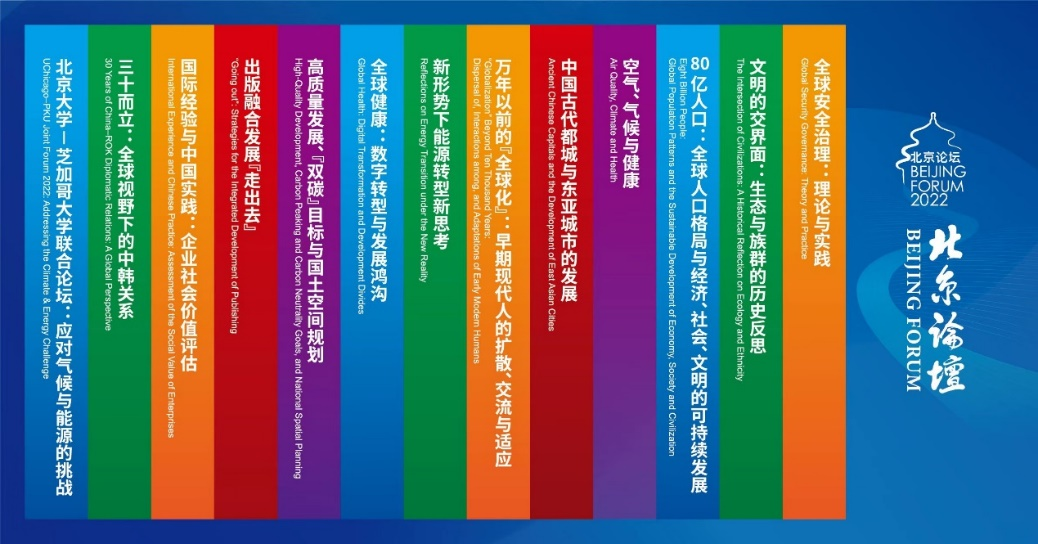Peking University, November 19, 2022: Themed “Creating a Future for Human Civilization: Trust, Dialogue and Cooperation,” the Beijing Forum (2022) commenced at the Diaoyutai State Guesthouse in Beijing on November 18, 2022. This year’s forum, joined on-site and virtually by leaders and scholars from around the world, explores the topic of forming an intertwined community of shared destiny through mutual trust, dialogue and close cooperation, and sheds light on a wide range of pressing issues, including climate change, global security, and global population patterns, etc.
The forum's opening ceremony was attended by Han Qide, Vice Chairman of the Standing Committee of the 10th and 11th National People's Congress and Vice Chairman of the 12th National Committee of the Chinese People's Political Consultative Conference, Huai Jinpeng, Secretary of the CPC Leading Group of the Ministry of Education and Minister of Education, Xia Linmao, Secretary of Education Work Committee of the Beijing Municipal Standing Committee, Li Meng, Vice Minister of Science and Technology, Zhou Zongmin, Vice Editor-in-Chief of Xinhua News Agency, Wang Hao, Vice Editor-in-Chief of China Daily, ten foreign ambassadors and representatives from New Zealand, Egypt, and African Union, Hao Ping, Chair of the Peking University Council, Gong Qihuang, President of Peking University, Qiao Jie, Executive Vice President of Peking University and President of Peking University Health Science Center (PKUHSC), and Wang Bo, Vice President and Provost of Peking University. The opening ceremony of this year’s forum was presided over by Wang Bo.
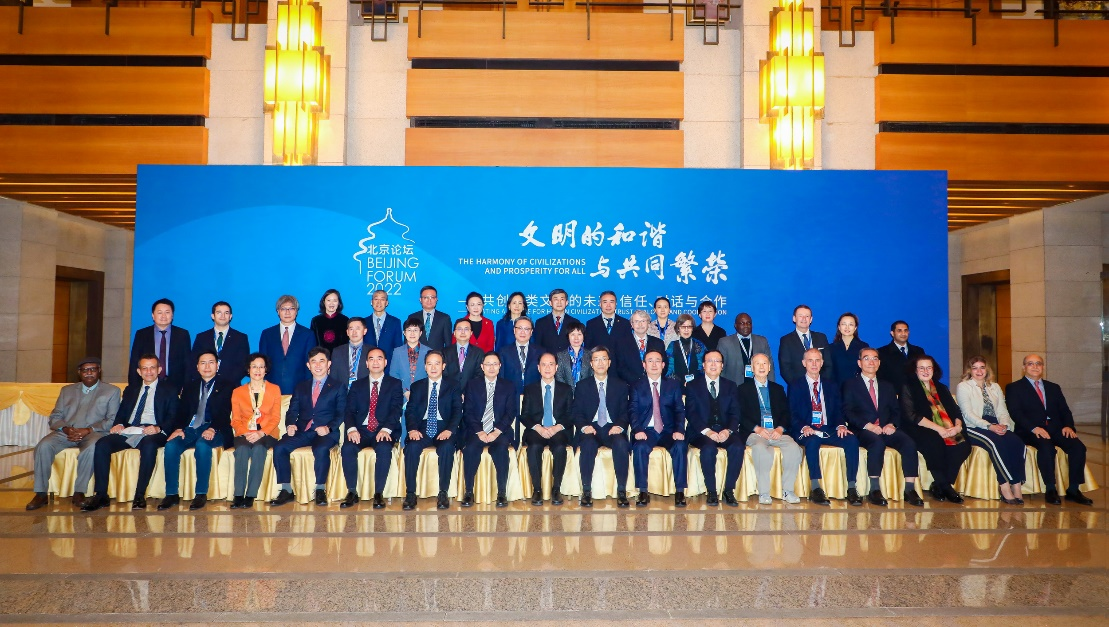
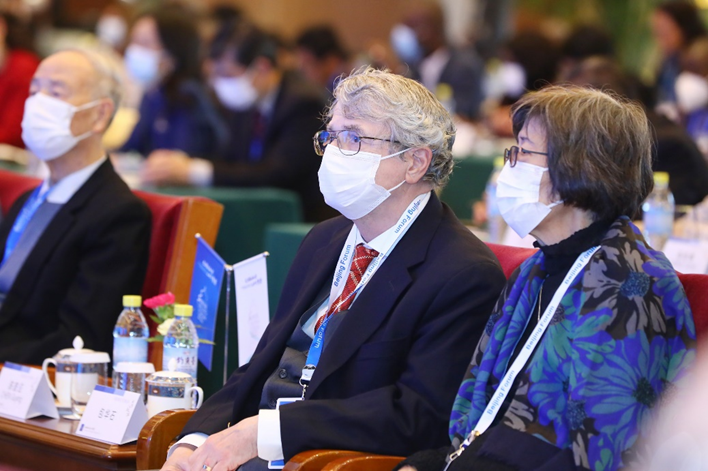
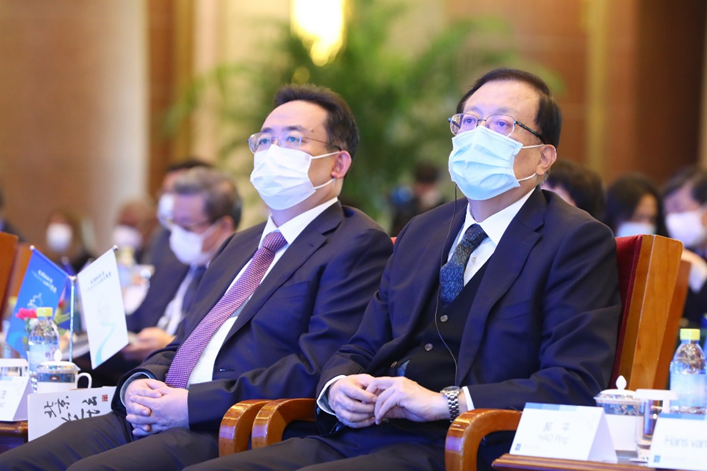
Xia Linmao (left) and PKU Council Chair Hao Ping attending the Beijing Forum (2022)
PKU President Gong Qihuang delivers an opening speech
On behalf of Peking University, PKU President Gong Qihuang delivered an opening speech at the forum, in which he offered his heartfelt welcome to the guests and scholars who attended the event. He noted that since its foundation in 2004, the Beijing Forum has been successfully held 18 times, with its theme “The Harmony of Civilizations and Prosperity for All” becoming a topical subject in the domestic and global academic communities.
In his speech, President Gong shared his three observations on higher education: first, universities should continue to enhance openness in education and act as a bridge connecting various civilizations; second, universities should improve the frameworks for international cooperation on innovation and pool wisdom to tackle common problems facing mankind; third, universities should seize the opportunities brought by digital and smart technologies and cultivate innovative talents who can lead on the global stage. He hoped that through dialogues and communications at this year’s forum, the participants could contribute more wisdom and strength to the harmony of civilizations and prosperity for all.
PKU Vice President Wang Bo reads out the congratulatory letter by Shahbaz Sharif, Prime Minister of the Islamic Republic of Pakistan
Shahbaz Sharif, Prime Minister of the Islamic Republic of Pakistan, sent a congratulatory letter to the Beijing Forum, in which he highlighted that for years, the forum has “remained a valuable platform for deepening mutual learning and understanding among civilizations of the world” and has become “instrumental in promoting extensive international cooperation and global discourse for world peace, socio-economic development, and civilizational progress.” With the world getting increasingly polarized, the need for international cooperation and dialogue “has become even more relevant than ever before,” he wrote in the letter, which was read out by Wang Bo, adding that academic institutions like Peking University “are ideally suited to serve as a bridge for international exchanges and act as a reservoir of ideas for finding solutions to important issues of our times.”
UNESCO Director-General Audre Azoulay delivers a speech via a video link
In a video message sent to the Beijing Forum (2022), UNESCO Director-General Audre Azoulay remarked that this year’s forum was timed “at a critical moment in our international agenda.” She enumerated a series of problems perplexing the world such as inflation, poverty, climate crisis, the global pandemic, racism, and gender discrimination, to name but a few. She stressed that to address the aforementioned issues, it is essential for the whole world to “come together again.” “We need dialogue. We need to build trust and understanding. We need this authentic, meaningful dialogue to overcome the problem and forge hope,” she pointed out. “We must unite their forces to implement and identify the best solutions to promote dialogue and cooperation.”
UChicago President Paul Alivisatos delivers a speech via a video link
Citing the “decades of partnership across many disciplines and modes of collaboration and exchange,” Paul Alivisatos, President of the University of Chicago (UChicago), praised the “longstanding friendship” between Peking University and the University of Chicago in a video message. “Over the years, we have worked together on a huge variety of topics, including medical training initiatives, strengthening and diversifying the field of social work in China, studies of planetary climates, joint courses on organic chemistry and psychiatric genomics, preservation of Chinese tomb art, increasing the global food supply, and the development of liberal arts curricula.”
“The collegiality and openness exhibited by the academic research community in addressing these problems present a model for broader global cooperation to share knowledge openly, learn from one another’s unique experiences, and build joint solutions to shared problems in consultation with those who are most impacted,” he added.
Chairman of SK Group Chey Tae-won delivers a speech via a video link
Chairman of SK Group Chey Tae-won noted in his video message that, despite global challenges, this year’s Beijing Forum “demonstrates our combined willingness to take on new challenges to continue our journey of knowledge sharing.” He spoke highly of the collaboration between Chey Institute for Advanced Studies and Peking University, noting that he was willing to “continue building our partnership to stimulate global dialogue across various key academic fields.”
Xia Linmao delivers his speech at the Beijing Forum (2022)
Xia Linmao extended his warm congratulations to the forum on behalf of the Beijing municipal government. Xia pointed out that in recent years, through continuous efforts, Beijing has built itself into an important window for the exchanges and mutual learning among different civilizations, in which Beijing Forum has acted as a bridge to promote cultural exchanges as well as dialogues and cooperations between China and the rest of the world. “I hope to see that through platforms for dialogues at the Beijing Forum, scholars from various countries can continue to promote understanding and friendship, so as to contribute wisdom to the global development and the future of mankind,” he said.
Huai Jinpeng delivers his speech at the Beijing Forum (2022)
Huai Jinpeng extended his congratulations on the holding of the forum on behalf of the Ministry of Education. He stressed that Chinese President Xi Jinping proposed the major concept of building a community with a shared future for mankind, which has gained active response and recognition from the international community. “Facing new opportunities and challenges in the new era, the Chinese educational community stands ready to work with countries from all over the world to undertake the mission of creating a better future for mankind through education,” the minister added.
Han Qide delivers his speech at the Beijing Forum (2022)
Han Qide expressed his warm congratulations on behalf of the Chinese Government. Han pointed out that since its foundation, the Beijing Forum has served as an important platform for people from all over the world to communicate and learn from each other and work together to address shared challenges. He hoped that the international community could enhance sincerity and trust, strengthen dialogues and communications, and achieve harmony and common prosperity by means of building a community with a shared future for mankind.
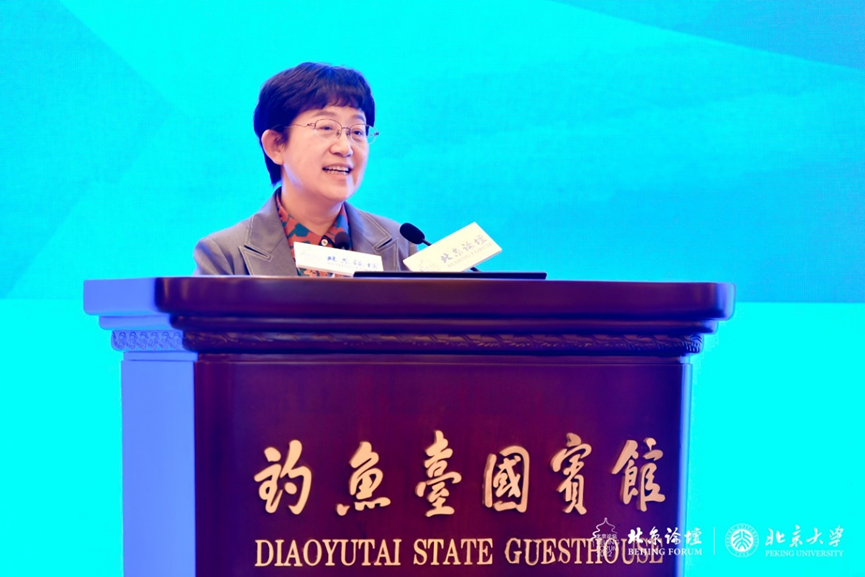
Qiao Jie presides over the keynote speech session of the Beijing Forum
The keynote speech session of this year’s Beijing Forum was presided over by Qiao Jie. The keynote speakers consisted of Qin Dahe, Director of the Academic Committee of State Key Laboratory of Cryosphere Science and Member of the Chinese Academy of Sciences, Hans van de Ven, Pro-Vice-Chancellor of Cambridge University and professor at the Department of East Asian Studies, Cambridge University, Aiji Tanaka, President of Waseda University, and Zhu Songchun, Dean of Beijing Institute for General Artificial Intelligence, Dean of School of Intelligence Science and Technology, and Dean of Institute for Artificial Intelligence at Peking University.
Qin Dahe delivers his keynote speech
With informative graphics and statistics, Academician Qin Dahe elaborated on the broad and extensive impact of climate change on human societies. His report, themed “Climate Change Science and Sustainable Development–From IPCC to Future Earth/Earth Commission,” underlined the broadening and accelerating impact of climate change and pinpointed the urgent need for carbon neutrality as well as the mitigation of other forms of greenhouse gases. In his speech, Qin also introduced the “Future Earth/Earth Commission,” a climate initiative, and stressed that it is up to everyone to alleviate climate change and protect our planet.
Hans van de Ven delivers his keynote speech
In his keynote speech, Hans van de Ven expanded on Wendell Willkie’s 1942 circumnavigation of the world. “We live in Covid time, which unfortunately has led to a sharp reduction in opportunities like this for the international exchange of ideas. That makes the Beijing Forum even more necessary and special,” the professor noted at the beginning of his speech, before enlarging on the details of his research subject—Wendell Willkie, an American politician who was important to stand up to American isolationists and who once circumnavigated the world in a modified Liberator bomber as President Roosevelt’s special representative. The professor was convinced that the globetrotting was still of modern significance. “…in a time of renewed global upheaval, it is worth remembering Willkie’s moment in the sun, partly reminder of the difficulties in forging a new world order even at that moment of maximum crisis and of the fact that China was involved in shaping that order,” he said.
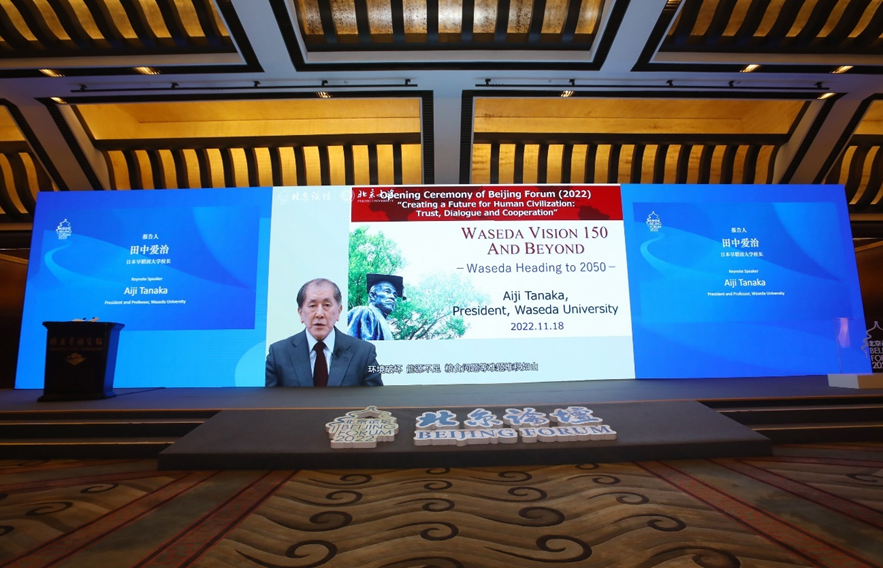
Aiji Tanaka delivers his keynote speech
Drawing from Waseda University’s experiences in internationalization, carbon neutrality, and smart cities, Aiji Tanaka in his speech proposed that people in the sphere of higher education should shoulder the historical responsibilities of promoting dialogues and cooperation, as well as building a bright future for humankind. He also expressed his hope that the Beijing Forum could become the cradleland of valuable academic exchanges, in which scholars could bring what they learn from the forum to their classes so that they can pass down to the young generation Beijing Forum’s spirit of “The Harmony of Civilizations and Prosperity for All.”
Zhu Songchun delivers his keynote speech
Professor Zhu Songchun’s speech concluded the keynote speech session of this year’s Beijing Forum, in which he deciphered the relationship between humans and society from the perspective of Artificial Intelligence (AI). He envisioned that “man-machine interaction” would become the future trend, and that AI would guide humans into the so-called “Great Harmony,” ushering in a new epoch of human-machine coexistence.
Apart from the main forum, this year’s Beijing Forum also comprises 12 sub-forums as well as one overseas sub-forum, putting the spotlight on pressing issues including climate change, air pollution, global security, and global population patterns. UChicago-PKU Joint Forum 2022, built upon the signature symposiums of PKU and UChicago, U.S.-China Forum (of UChicago) and Beijing Forum (of PKU), commenced on October 13, under the theme “Addressing the Climate and Energy Challenge,” constituting a “sister forum” with the Beijing Forum.
The Beijing Forum, initiated in 2004, is an annual event organized under the auspices of the Beijing Municipal Government. It is endorsed by the State Council and the Ministry of Education of the People’s Republic of China and co-sponsored by Peking University, Beijing Municipal Education Commission, and the Chey Institute for Advanced Studies. Over the past 19 years, the academic event has been joined by more than 7,000 dignitaries and famed scholars from over 80 countries and regions.
Written by: Meng Bin
Pictured by: Li Xianghua, Song Mengli, Qi Liang, Huang Jingwen, Office of Global Communications
